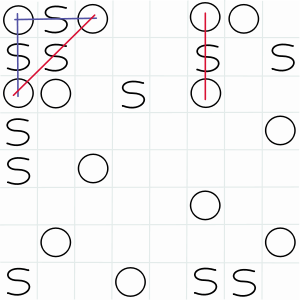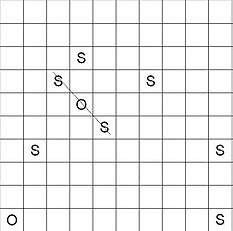SOS (game)

SOS is a (usually two-player but may be more) game played with paper and pencil. It is similar to tic-tac-toe but with more complexity. It is also similar to dots and boxes.[1]

Before play begins, a square grid of at least 3x3 squares in size is drawn. Players take turns to add either an "S" or an "O" to any square, with no requirement to use the same letter each turn. The object of the game is for each player to attempt to create the straight sequence S-O-S among connected squares (either diagonally, horizontally, or vertically), and to create as many such sequences as they can. If a player succeeds in creating an SOS, that player immediately takes another turn, and continues to do so until no SOS can be created on their turn. Otherwise turns alternate between players after each move.[2][3]
Keeping track of who made which SOSs can be done by, e.g., one player circling their SOSs and the other player drawing a line through theirs. Once the grid has been filled up, the winner is the player who made the most SOSs.[3][4][5] If the grid is filled up and the number of SOSs for each player is the same, then the game is a draw.
The game can also be played where the player who creates an SOS is the winner and if no SOSs are created the game is a draw.[6]
SOS is a game of skill and an abstract strategy game. It is also a combinatorial game (when played with two players). In terms of game theory, it is a zero-sum, sequential game with perfect information.
References
- ↑ "bears: a paper-and-pencil game". DeepFUN. 2015-08-04. Retrieved 2016-12-04.
- ↑ Ferguson, Thomas S. (2014), "Part I: Impartial Combinatorial Games" (PDF), Game Theory (2nd ed.), Mathematics Department, UCLA, p. I-8.
- 1 2 "SoS Game". SlideME. Retrieved 2016-12-04.
- ↑ New Maths Ahead Book 5. Orient Blackswan. ISBN 9788125023852.
- ↑ Harrelson, Angie (2007-07-01). Patterns - Literature, Arts, and Science. Prufrock Press Inc. ISBN 9781593632618.
- ↑ Gould, Ronald J. (2015-10-28). Mathematics in Games, Sports, and Gambling: The Games People Play, Second Edition. CRC Press. ISBN 9781498719537.
External links
- "An Assortment of Combinatorial Games," pg. 8, at Prof. Hugh L. Montgomery's University of Michigan website. Also available in PostScript format.